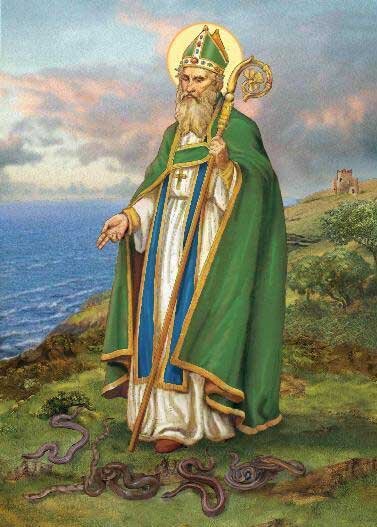Forget St. Patrick's Day - Let's celebrate Liberalia!
Here in America St. Patricks day is a holiday of Guiness-drinking, corn-beef-eating, and raucous parades. But, did you know this holiday replaced a much older, pagan one?
But before we get to that let’s review a few myths and legends about St.Patrick. Firstly, St. Patrick himself was not actually Irish. He was born in England or Scotland, then was enslaved by Irish raiders at 16. They transported him to Ireland but he escaped back to England, which is where he received his religious instruction, and then eventually came to Ireland to serve as a missionary.
Even though St.Patrick was born in Britain, he wasn’t really British as the British Isles were occupied by the Romans at this time. Some documents also show that he and his family may have been part of the Roman aristocracy.
One of the main stories attributed to St. Patrick is that he banished the snakes from Ireland. Well, Ireland has never had snakes either before or after St. Patrick - so what does this mean? It's likely that the “snakes” in this case refer to the Irish Pagans.
It is said that St. Patrick stood on an Irish hillside and delivered a sermon that drove the island’s serpents into the sea. So what do you think they’re really saying there?
In my view there are two ways to think about St. Patrick. You can believe in the miracles and mythos of St. Patrick; that he was a powerful and fearsome leader of the Christian faith. Looking through that lens we can surmise that the phrase “Patrick stood on an Irish hillside and delivered a sermon that drove the island’s serpents into the sea” means that St.Patrick forcefully drove the Pagans (or “snakes” in this case) towards the hillside and those that refused to convert were tossed off the hill to their death.
Or, we can look at a more historical version of St.Patrick's story. Documents state that while Patrick began the process of introducing the Irish to Christianity, it does not appear that he had nearly the phenomenal success that later writers would attribute to him. The historical Patrick was not remembered as an enormously successful missionary and at the time of his death Ireland was still predominantly pagan.
So for March 17th this year instead of celebrating St.Patrick's Day I’m going to celebrate another holiday that occurred on March 17th - I’m talking about the ancient Roman festival of Liberalia.
Liberalia celebrates Liber (a god of wine and fertility, similar to Bacchus) and his consort Libera (a goddess of agriculture and also wine). Liberalia is celebrated with feasting, processions, and the singing of lewd and inappropriate songs. So with Liberalia you still get all the fun parts of St.Patrick's Day.
Now beyond the feasting and drinking of Liberalia, there was a deeper meaning to the holiday. It was a coming-of-age festival celebrating the transition of boys into manhood. Roman boys, usually at age 16, would remove the bulla praetexta (a hollow charm of gold or leather) which parents placed about the necks of their children. At the Liberalia ceremony the young men would place the bulla on an altar and dedicate it to the Lares, who were gods of the household and family. This symbolized that they were no longer boys but were now men.
The young men also discarded the toga praetexta, which was decorated with a purple border and donned the clothing of adulthood, which was a white toga. The new toga identified him as a citizen of Rome, making him an eligible voter. The fathers then took their sons to the forum to present them as adults and citizens of Rome.
So, how can we as modern Pagans celebrate Liberalia? Well the writings of the Roman poet Ovid might give us some ideas. In talking about Liberalia and the God Liber he states:
“Liber, before your birth the altars were without offerings, And grass appeared on the stone-cold hearths. They tell how you set aside the first fruits for Jupiter after subduing the Ganges region and the whole of the East. You were the first to offer up cinnamon and incense from conquered lands, and the roast entrails of triumphal oxen. Libations derive their name from their originator, And cake (liba) since a part is offered on the sacred hearth. Honey-cakes are baked for the god, because he delights in sweet Substances, and they say that Bacchus discovered honey. Father Liber loves honey: its right to offer its discoverer glittering honey diffused through oven-warm cakes.”
So, personally I think I’m going to skip the roasting of Ox entrails that Ovid mentions, but I do plan on creating a honey cake to honor the God Liber. There are several ancient roman recipes for honey cakes. Here's the recipe I'll be trying out next week: https://www.howtocookthat.net/…/2000-year-old-cake-recipe-…/
What are your thoughts about St.Patrick’s Day? There is so much to the story of St.Patrick that I couldn’t include it all in this video. There’s also a fascinating lecture by Thomas Sheridan that goes in-depth about the story of Irish Paganism in case you'd like additional context. I’d also love to hear if you’re thinking about doing anything to celebrate Liberalia or if you'll be celebrating St.Patricks day this year. Comment your thoughts below. 😊



